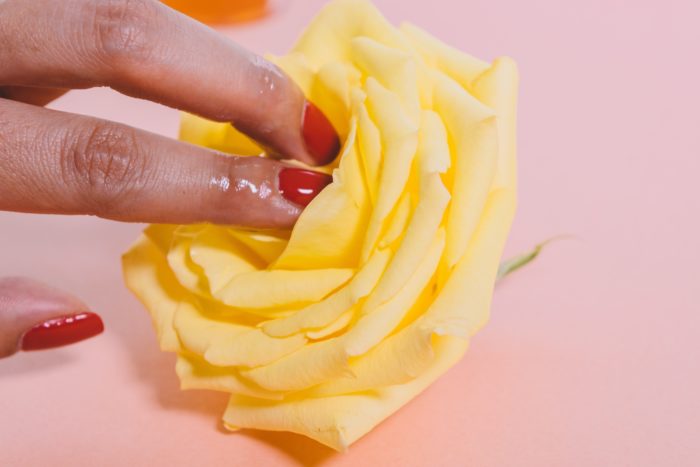 I’m a 30-something single woman, and here’s how my most recent Tinder date went: I put on a Reformation dress with a plunging neckline and showed up to a vegan diner that my date chose. He was a writer in his late twenties with glasses and a Keanu Reeves-like raspy voice. In fact, he had a very smoldering Keanu vibe all around in his quietly intense demeanor. We had interesting conversations about literature and politics, and as our vegan chicken sandwiches were winding down, he asked: “What should we do next?” I floated that I have a bottle of rosé at home (my signature move!). He was thrilled to be invited; but once we were done browsing my bookcase and moved on to making out, I found he wasn’t aroused.
I’m a 30-something single woman, and here’s how my most recent Tinder date went: I put on a Reformation dress with a plunging neckline and showed up to a vegan diner that my date chose. He was a writer in his late twenties with glasses and a Keanu Reeves-like raspy voice. In fact, he had a very smoldering Keanu vibe all around in his quietly intense demeanor. We had interesting conversations about literature and politics, and as our vegan chicken sandwiches were winding down, he asked: “What should we do next?” I floated that I have a bottle of rosé at home (my signature move!). He was thrilled to be invited; but once we were done browsing my bookcase and moved on to making out, I found he wasn’t aroused.
At this point, he apologized and confessed that he was feeling insecure because of his eczema. And I empathized with him—but that didn’t keep me from letting him know the next morning that we’re physically not a match. The reason I tell this story is that 10 or so years ago, I would have listened to his pleas for second chance, accepted his reasoning with compassion, and gone on more dates half-heartedly in order to feel that I was “being fair.” I’ve heard this dating advice all my life that “it’s hard to know someone just from the first date.” In my 30s, I’m experienced enough to know that your body is often wiser than your head, and that you must respect your own feelings first. This, to me, is sex positivity at its core, more than kink or taking of nude photos in costume or going to Burning Man. (Of course, sex positivity can and does include those things for many people.)
I wasn’t always this empowered about owning my own sexuality. It wasn’t that I was afraid or ashamed of sex: I feel like my development was pretty healthy and balanced, from giggling about first kisses at high school dances to having sex for the first time with my college boyfriend. It’s only in retrospect I can see just how wrong he was for me in every aspect. But at the time, equipped with the self-knowledge of a vegan marshmallow I fell head over heels in love with him. We had sex around 5-7 times a week in the two years we dated—a number that seems too unbelievably high for me now (we have like, jobs?!), but felt perfectly reasonable at age 19. But in all those times we had intercourse, oral, and manual sex, I never orgasmed with him even once. He never knew about it because I didn’t want to hurt his feelings.
At the time, this imbalance didn’t feel unfair to me. I relished being able to satisfy his desire although he didn’t seem particularly concerned about helping me achieve mine. When we broke up, I went through a string of men who (for the most part) also were not focused on my satisfaction. My next long-term boyfriend was more or less the same story: I loved him very much, spiritually and emotionally—but physically, I didn’t feel much of a connection and he didn’t make an effort to make the experience more satisfying for me. Over the several years of that relationship, I orgasmed just two or three times with him. This, despite being a young woman of healthy libido, knowledge of her own anatomy, passionate interest in others, and assertive, confident attitude in other areas of her life.
I’m not alone in experiencing this disparity. One of my friends has only climaxed with one man in her life, starting at age 29. Her previous sexual experiences have also catered more toward male pleasure than her own. Why women still let this happen probably has a lot to do with cultural expectations. The myth that female desire is simply lower than a male one has existed throughout human history, and still persists today. Here’s Emily Esfahani Smith of The Atlantic arguing in a largely senseless way that “On its face, the flexible arousability of the female sex drive seems to be an indication of its strength, and that is what Bergner implies [in his book What Do Women Want]. But in truth, it is an indication of the very opposite, its weakness.” Hmm, how does women getting aroused by vastly more varied range of stimuli than men show that they have, in fact, weaker desire? How does that mean that “in fact, the very flexibility of the female sex drive implies that women are more willing to prioritize monogamy over their libido”? Question mark, question mark?
If desire has anything to do with frequency of sex, one could argue that in fact, young women have higher desire than their male counterparts. The number of people having *no sex* increased for both men and women in the last thirty years. But while in men that number has almost tripled to 28%, in women it went up just 8% to 18%. The % of celibacy in men and women have been about equal in the previous decades; recent gap shows that women are now having sex at a higher rate than men.
And that at least is an encouraging sign. There has been an explosion of female-oriented and ethical porn, sex toys and products, to even pretty BDSM gear that caters to Millennials. In the very liberal city I live, pansexual, sapiosexual, queer, poly, kink, and other once-rare or taboo words are just a part of daily parlance. It’s great that more women are open about their sexual preferences and needs in public. From my experience however, the most important step in sex positivity is in the privacy of an intimate relationship. Even when you’re afraid of hurting your partner or rocking the boat, owning your sexuality isn’t possible without being honest first.
At one point in my late-twenties, I slept with people who made sure my experience was as satisfying as their own. This led me to being much more honest about my needs from the beginning. While I have less frequent encounters (at this age, really I just cannot), my sex life is actually far more satisfying than it has been for most of my twenties. It has made me a less ideal girlfriend—and a much more fulfilled woman. As Simone de Beauvoir wrote: “On the day when it will be possible for woman to love not in her weakness but in her strength, not to escape herself but to find herself, not to abase herself but to assert herself–on that day love will become for her, as for man, a source of life and not of mortal danger.” When you can assert yourself in your desire, you are able to achieve the fullest expression of your womanhood—and a more complete love.
Related: How Baring It All On A Nude Beach Gave Me A New Perspective On The Human Body
Raw Vegan Libido-Boosting Superfood Chocolate Bark
Get more like this—Sign up for our daily inspirational newsletter for exclusive content!
__
Photo: Malvestida Magazine on Unsplash; Christopher Campbell on Unsplash





